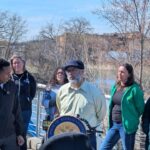The word “cowboy” brings to mind images of the Wild West, but the first cowboys splashed across the Bronx River – and they were not the Hopalong Cassidy kind.
During the Revolutionary War, when most of the present-day Bronx was a “neutral ground” between the two contending armies, James Delancey turned his West Farms estate into a Tory stronghold. Gathering around him men driven from their homes by Patriot raiders, he organized them into a pro-British fighting force nicknamed Delancey’s Refugees.
Though armed to fight for King George, Delancey’s battalion seldom drew pay or rations from the British Army, so they developed a more creative funding stream by rustling cattle up and down the Bronx River valley and driving them to Kingsbridge, where British quartermasters paid in cash and asked no questions.
The depredations of Delancey’s Refugees and others like them soon earned them the name of “Cow-boys,” while their pro-American counterparts were dubbed “Skinners,” an apt description of the thoroughness with which they cleaned out their victims. While some, like Claudius Smith in the upstate Ramapo Mountains, insisted they were partisans acting in the King’s name, Cowboys and Skinners alike were often men who in fact served no cause but their own, and, like rustlers in the Wild West a century later, could expect no mercy if caught.
Though the term “Skinner” sank into oblivion, the word “Cowboy,” preserved in James Fenimore Cooper’s 1821 novel, The Spy, remained a term of insult through most of the century following the Revolution. It was mainly with the rise of Western movies in the twentieth century that “cowboy” came to mean a hero instead of a villain.
Stephen Paul DeVillo





